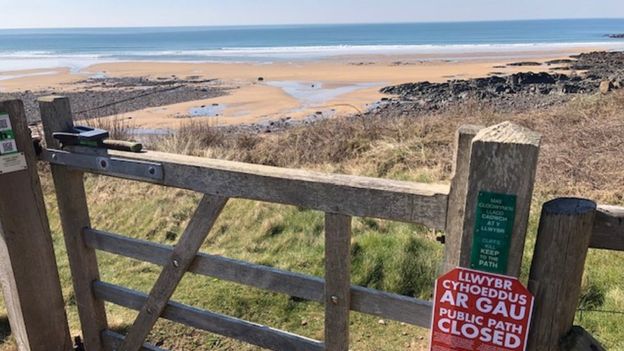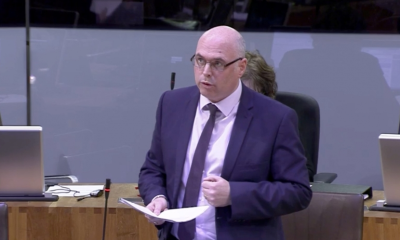News
Reports continue about holiday businesses receiving visitors and second homes use

Reports of holiday businesses receiving visitors and second homes
being occupied locally continue to be received by Pembrokeshire
County Council.
The regulations are clear that residents should stay at their primary
residence and that travel to holiday accommodation or second homes
is not essential travel.
Police officers have the power to issue fixed penalty notices and turn
those travelling around.
Across the Easter weekend police and Council officers stopped 1,660
vehicles with 39 fixed penalty notices issued to those deemed to have
left their homes without reasonable excuse.
Further traffic checks are continuing day and night.
Travelling to a second home or holiday accommodation risks
introducing the virus to rural communities from areas where the
disease might be more prevalent.
It also places additional strain on local health services where
provision is based on resident population.
There are also concerns of increasing anxieties and possible tensions
in rural communities.
For clarity, all holiday accommodation businesses listed below are to
remain closed to the public until further notice, apart from the certain
limited exceptions described.
Holiday sites
Camping sites
Hotels and bed and breakfast accommodation
Other holiday accommodation (including holiday apartments, hostels
and boarding houses)
These businesses can be specifically requested to operate by the
Welsh Ministers or by Local Authorities for a limited number of
reasons. Such reasons include:
accommodating key / critical workers (as defined by Welsh
Government)
accommodating those who have been displaced or are
homeless, or;
providing accommodation for health patients.
If a business is specifically requested to open by Welsh Ministers or a
Local Authority, this provision should not be taken to mean that the
whole site or business can reopen.
Any permitted re-opening will be specific and limited to the purposes
set out in the request.
The fact the Welsh Ministers or Local Authorities may request a
business to open for a specific purpose does not authorise it to open
for any other purpose and nor does it oblige the business to open.
Some holiday businesses in the County are currently accommodating
key workers but if such businesses have not yet been asked to do so
by the Welsh Ministers or a Local Authority, they must make
Pembrokeshire County Council aware of this as a matter of urgency.
They need to ensure that a written request is forthcoming from the
Welsh Ministers or Local Authority and they may only remain open in
response to such a request.
Enforcement action will be undertaken against any holiday
accommodation business that continues to operate without such a
request having been made.
Our communities continue to be monitored in partnership with Dyfed
Powys Police and officers of the Council’s Public Protection team for
compliance.
If you have information that causes you concern in your community
relating to the use of holiday accommodation and buildings please
contact the Council at [email protected]
There is also currently a particular challenge in terms of securing
sufficient accommodation for vulnerable groups.
Holiday accommodation businesses in Pembrokeshire are being
requested to consider providing accommodation for such groups.
If you currently own or manage holiday accommodation businesses in
Pembrokeshire and would like to make this accommodation available
for this purpose, please email [email protected] with
contact details.
If you have already responded to the Welsh Government’s request,
please let the Council know to update records.
If you are operating a business in Pembrokeshire and want to make
sure that you are only operating within the correct permission under
The Health Protection (Coronavirus Restrictions) (Wales) Regulations
2020 please contact email [email protected]
Health
Paul Davies responds to St David’s Surgery news

LOCAL Senedd Member Paul Davies has reacted to the news that St David’s surgery in North Pembrokeshire has decided to resign its General Medical Services Contract. It’s understood that for registered patients, care will continue to be provided until the end of October 2024 and patients are being advised to remain registered with the Practice while longer-term plans are developed. Patients will be invited to share their views as to how these services can continue to be delivered after the end of October.
Mr Davies said, “This is a very worrying announcement and patients in the local area will be understandably anxious about what this means for the future.”
“It’s vital that GP services can continue to be delivered in the area in the future and so Hywel Dda University Health Board must be open with patients of the Practice about their plans and address the community’s concerns. Every effort must be made to ensure that patients are able to access services in the long term.”
“I will of course, be raising this with the Welsh Government and urging the Health Minister to do everything in her power to support the Health Board and help ensure patients can access these vital services.”
Crime
Organised Crime Group member found hiding under a pile of clothes jailed

A OCG member, who hid from officers under a pile of clothes, has received a prison sentence of almost five years.
Rhys Jones, 21, appeared before Swansea Crown Court on Wednesday 17 April, after pleading guilty to possession with intent to supply Class A drugs – heroin and burglary.
He was sentenced to four years and 10 months imprisonment.
Jones was arrested following a warrant at his address where he was found in possession of heroin with a street value of more than £25,000.
He was later caught on CCTV using a stolen bank card linking him to a burglary where a car, money and bank cards had been taken in the early hours of the morning.
The car has since been recovered.
Rhys Jones, the officer in the case, said: “Jones was arrested as part of Operation Bergen, a proactive and collaborate operation set by our Serious Organised Crime (SOC) and Neighbourhood team, to tackle serious organised crime in Rhymney and the surrounding area.
“He is a significant member of a serious organised crime group and was found in possession of vast quantities of heroin.
“We know that drug supply often has links into different types of criminal behaviour and Jones went on to commit further offences – showing his complete disregard for the criminal justice system and the community that he is a part of.
“Jones was driven by greed – selling drug to make money for the OCG and line his own pockets with no consideration for the harm and distress he caused.
“The public play a vital role by providing intelligence about drug dealing in their area and we welcome any information from our communities to help us tackle illegal activity.”
News
The Energy Conundrum: Bitcoin vs. Traditional Banking

The financial sector is facing significant energy challenges, with both Bitcoin and traditional banking contributing to environmental concerns. This article explores innovative solutions aimed at reducing the energy consumption and carbon footprint of these financial activities, highlighting the importance of sustainability in the industry. For cutting-edge strategies and initiatives addressing the energy challenges in the financial sector, visit the Terranox Website to learn about innovative solutions promoting sustainability and environmental responsibility.
The Energy Dynamics of Bitcoin
The energy dynamics of Bitcoin are a complex interplay between the technology’s innovative potential and its environmental impact. Bitcoin mining, the process that keeps the Bitcoin network secure and functional, is at the heart of these energy dynamics.
This process involves solving complex mathematical puzzles to validate transactions and add them to the blockchain, a task that requires significant computational power. As a result, Bitcoin mining operations often use large arrays of specialized hardware known as ASICs (Application-Specific Integrated Circuits), which consume substantial amounts of electricity.
The high energy consumption of Bitcoin mining has raised concerns, especially as the network grows and the difficulty of mining increases. Critics argue that the environmental cost of Bitcoin mining could outweigh its benefits, particularly in regions where electricity is generated from fossil fuels, contributing to greenhouse gas emissions and climate change.
However, proponents of Bitcoin argue that the network’s energy usage is a necessary investment in a decentralized and secure financial system, and that it is comparable to or even less than the energy consumption of traditional financial systems when considering the full lifecycle of money, including printing, transportation, and storage.
Furthermore, the Bitcoin community is actively seeking ways to reduce its environmental impact. One approach is the increasing use of renewable energy sources for mining operations. Hydroelectric power, solar energy, and wind energy are becoming more common in Bitcoin mining, particularly in regions where these resources are abundant and cheap.
The Environmental Footprint of Traditional Banking
The environmental footprint of traditional banking is a multifaceted issue that encompasses various aspects of the banking sector’s operations. Unlike the digital realm of cryptocurrencies, traditional banking relies heavily on physical infrastructure, including bank branches, ATMs, and the production and transportation of currency. These elements contribute to the sector’s energy consumption and carbon emissions.
Bank branches and ATMs are ubiquitous, and their operation requires energy for lighting, heating, cooling, and running electronic systems. The energy used in these facilities often comes from non-renewable sources, contributing to the carbon footprint of the banking sector. Additionally, the construction and maintenance of physical banking infrastructure involve the use of materials and resources, further adding to the environmental impact.
The production and transportation of physical currency are other significant contributors to the environmental footprint of traditional banking. The process of printing banknotes and minting coins requires energy and resources, and the transportation of currency between banks, businesses, and consumers generates carbon emissions. The management of cash, including its storage and security, also entails energy consumption.
In response to these environmental concerns, the banking sector is increasingly adopting sustainable practices. Many banks are investing in energy-efficient buildings and technologies to reduce their carbon footprint. Digital banking is being promoted as a more environmentally friendly alternative to physical banking, as it reduces the need for paper and physical infrastructure. However, digital banking is not without its environmental impact, as data centers and network infrastructure require energy to operate.
Innovations and Solutions
In addressing the energy challenges associated with both Bitcoin and traditional banking, several innovations and solutions are being explored and implemented. These efforts aim to reduce the environmental impact of financial activities while maintaining or even enhancing the efficiency and security of transactions.
In the realm of Bitcoin, one significant innovation is the development of more energy-efficient mining hardware. Advances in technology have led to the creation of mining rigs that require less electricity to perform the complex computations necessary for securing the blockchain.
Solar, wind, and hydroelectric power are increasingly being harnessed to provide the electricity needed for mining, thereby reducing the reliance on fossil fuels and mitigating the carbon footprint of the cryptocurrency. Some mining facilities are even being set up in locations with excess renewable energy, such as regions with abundant hydroelectric power, to take advantage of lower energy costs and contribute to a more sustainable mining ecosystem.
Digital banking is one such innovation, as it reduces the need for physical infrastructure and the associated energy consumption. By enabling customers to conduct transactions online or through mobile apps, banks can decrease the usage of paper, lower the energy required for operating branches, and minimize the carbon emissions from commuting to and from bank locations.
Conclusion
In conclusion, the financial sector is actively seeking ways to address its environmental impact. Through advancements in technology, the adoption of renewable energy sources, and the promotion of green finance, both Bitcoin and traditional banking are making strides toward a more sustainable future.
-

 News7 days ago
News7 days agoSearch for missing teenager Luke continues at Pembroke Dock
-

 News5 days ago
News5 days agoPolice issue update on the search for Luke, missing from Pembroke Dock
-

 News7 days ago
News7 days agoPembrokeshire hostel manager narrowly avoids jail sentence
-

 Sport6 days ago
Sport6 days agoHerbrandston Clinch Promotion to Division One
-

 News4 days ago
News4 days ago20mph U-turn: Some roads will return to 30mph following public outcry
-

 Community4 days ago
Community4 days agoMiracle pup finds her forever home after heart-wrenching journey
-

 News2 hours ago
News2 hours agoPolice and air ambulances at ‘serious incident’ at West Wales school
-

 Crime7 days ago
Crime7 days agoPembrokeshire car salesman caught driving on cocaine
































